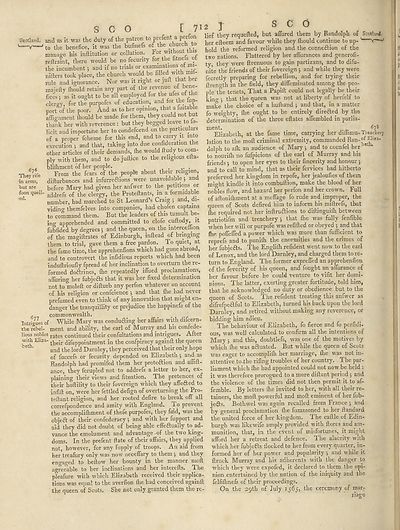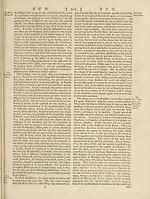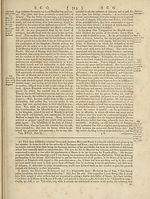Encyclopaedia Britannica, or, a Dictionary of arts, sciences, and miscellaneous literature : enlarged and improved. Illustrated with nearly six hundred engravings > Volume 18, RHI-SCR
(750) Page 712
Download files
Complete book:
Individual page:
Thumbnail gallery: Grid view | List view

They rife
in arms,
but are
SCO [ 71
Scotland, and as It was the duty of the patron to prefent a perfon
to the benefice, it was the bufinefs of the church to
manage his inftitution or collation. For wttrout ns
reftraint, there would be no fecurity for the fitnels o
the incumbent ; and if no trials or examinations ot mi-
nifters took place, the church would be filled with mi -
rule and ignorance. Nor was it right or juft that her
maiefty ftiould retain any part of the revenue of bene¬
fices : as it ought to be all employed for the ufes of the
clergy, for the purpofes of education, and tor the iup-
port of the poor. And as to her opinion, that a Citable
aflignment thould be made for them, they could not but
thank her with reverence : but they begged leave to lo-
licit and importune her to condefcend on the particulars
of a proper fcheme for this end, and to carry it into
execution ; and that, taking into due confideration the
other articles of their demands, the would ftudy to com¬
ply with them, and to do juftice to the religious efta-
bliftiment of her people.
From the fears of the people about their religion,
difturbances and infurre&ions were unavoidable; and
before Mary had given her anfwer to the petitions or
foon quell- addrefs of the clergy? the Proteftants, in a formidable
number, had marched to St Leonard’s Craig ; and, di¬
viding themfelves into companies, had chofen captains
to command them. But the leaders of this tumult be-
ino- apprehended and committed to clofe cuftody, it
fubfided by degrees j and the queen, on the intercefijon
of the magiftrates of Edinburgh, inftead of bringing
them to trial, gave them a free pardon. To quiet, at
the fame time, the apprehenfions which had gone abroad,
and to controvert the infidious reports which had been
induftrioufly fpread of her inclination to overturn the re¬
formed doftrines, (he repeatedly iffued proclamations,
afluring her fubjefts that it was her fixed determination
not to moleft or difturb any perfon whatever on account
of his religion or confcience j and that (he had never
prefumed even to think of any innovation that might en¬
danger the tranquillity or prejudice the happinefs of the
* commonwealth. 4 .
Intrigues of While Mary was condufting her affairs with diicern-
the rebel- ment and ability, the earl of Murray and his confede-
lious nobles j-^gg continued their confultations and intrigues. After
their difappointment in the confpiracy againft the queen
and the lord Darnley, they perceived that their only hope
of fuccefs or fecurity depended on Elizabeth ; and as
Randolph had promifed them her prote&ion and afiift-
ance, they fcrupled not to addrefs a letter to her, ex¬
plaining their views and fituation. The pretences of
their hoftility to their fovereign which they affefted to
infill on, were her fettled defign of overturning the Pro-
teftant religion, and her rooted defire to break off all
correfpondence and amity with England. T- o prevent
the accomplilhment of thefe purpofes, they faid, was the
objeft of their confederacy \ and with her fupport and
aid they did not doubt of being able effe&ually to_ ad¬
vance the emolument and advantage of the two king¬
doms. In the prefent ftate of their affairs, they applied
not, however, for any fupply of troops. An aid from
her treafury only was now neceffary to them j and they
engaged to bellow her bounty in the manner moft
agreeable to her inclinations and her interefts. The
pleafure with which Elizabeth received their applica¬
tions was equal to the averfion the had conceived againft
the queen of Scots. She not only granted them the re-
2 ] s C d
lief they requefted, but affured them by Randolph of Scotland
her efteem and favour while they fhould continue to up-—v—'
hold the reformed religion and the connexion of the
two nations. Flattered by her affurances and generofi-
ty, they were ftrenuous to gain partizans, and to difu-
nite the friends of their fovereign j and while they were
fecretly preparing for rebellion, and for trying their
ftrength in the field, they diffeminated among the peo¬
ple the tenets, That a Papift could not legally be their
king j that the queen was not at liberty of herfelf to
make the choice of a hulband ; and that, in a matter
fo weighty, lire ought to be entirely dire&ed by the
determination of the three eftates affembled in parlia-
rcient' . ^78
Elizabeth, at the fame time, carrying her diflimu- Treachery
lation to the moft criminal extremity, commanded Ran-°f Ellza-
dolph to a Ik an audience of Mary; and to counfel her 11
to nourilh no fufpicions of the earl of Murray and his
friends; to open her eyes to their fincerity and honour ;
and to call to mind, that as their fervices had hitherto
preferved her kingdom in repofe, her jealoufies of them
mio-ht kindle it into combuftion, make the blood of her
nobles flow, and hazard her perfon and her crown. Full
of aftonilhment at a meffage fo rude and improper, the
queen of Scots defired him to inform his miftrefs, that
fhe required not her inftruflions to diftinguilh between
patriotifm and treachery ; that Ihe was fully fenfible
when her will or purpofe tvas refilled or obeyed ; and that
fhe. poffeffed a power which was more than fufficient to
reprefs and to punilh the enormities and the crimes of
her fubjefts. The Englilh refident went now to the earl
of Lenox, and the lord Darnley, and charged them tore-
turn to England. The former expreffed an apprehenfion
of the feverity of his queen, and fought an affurance of
her favour before he could venture to vifit her domi-
The latter, exerting greater fortitude, told him,
mons.
with Eliza¬
beth.
that he acknowledged no duty or obedience but to the
queen of Scots. The refident treating this anfwer as
difrefpe£lful to Elizabeth, turned his back upon the lord
Darnley, and retired without making any reverence, or
bidding him adieu.
The behaviour of Elizabeth, fo fierce and fo perfidi¬
ous, was well calculated to confirm all the intentions of
Mary ; and this, doubtlefs, was one of the motives by
which Ihe was a&uated. But while the queen of Scots
was eager to accomplilh her marriage, {he was not in¬
attentive to .the riling troubles of her country. The par¬
liament which Ihe had appointed could not now be held :
it was therefore prorogued to a more diftant period ; and
the violence of the times did not then permit it to af-
femble. By letters lire invited to her, with all their re¬
tainers, the moft powerful and moft eminent of her fub-
je£ls. Bothwel was again recalled from France ; and
by general proclamation Ihe fummoned to her ftandard
the united force of her kingdom. The caftle of Edin¬
burgh was likewife amply provided with flores and am¬
munition, that, in the event of misfortunes, it might
afford her a retreat and defence. The alacrity with
which her fubjefls flocked to her from every quarter, in¬
formed her of her power and popularity ; and while it
ft ruck Murray and his adherents with the danger to
which they ivere expofed, it declared to them the opi¬
nion entertained by the nation of the iniquity and the
felfilhnefs of their proceedings.
On the 29th of July 1565, the ceremony of mar¬
riage
in arms,
but are
SCO [ 71
Scotland, and as It was the duty of the patron to prefent a perfon
to the benefice, it was the bufinefs of the church to
manage his inftitution or collation. For wttrout ns
reftraint, there would be no fecurity for the fitnels o
the incumbent ; and if no trials or examinations ot mi-
nifters took place, the church would be filled with mi -
rule and ignorance. Nor was it right or juft that her
maiefty ftiould retain any part of the revenue of bene¬
fices : as it ought to be all employed for the ufes of the
clergy, for the purpofes of education, and tor the iup-
port of the poor. And as to her opinion, that a Citable
aflignment thould be made for them, they could not but
thank her with reverence : but they begged leave to lo-
licit and importune her to condefcend on the particulars
of a proper fcheme for this end, and to carry it into
execution ; and that, taking into due confideration the
other articles of their demands, the would ftudy to com¬
ply with them, and to do juftice to the religious efta-
bliftiment of her people.
From the fears of the people about their religion,
difturbances and infurre&ions were unavoidable; and
before Mary had given her anfwer to the petitions or
foon quell- addrefs of the clergy? the Proteftants, in a formidable
number, had marched to St Leonard’s Craig ; and, di¬
viding themfelves into companies, had chofen captains
to command them. But the leaders of this tumult be-
ino- apprehended and committed to clofe cuftody, it
fubfided by degrees j and the queen, on the intercefijon
of the magiftrates of Edinburgh, inftead of bringing
them to trial, gave them a free pardon. To quiet, at
the fame time, the apprehenfions which had gone abroad,
and to controvert the infidious reports which had been
induftrioufly fpread of her inclination to overturn the re¬
formed doftrines, (he repeatedly iffued proclamations,
afluring her fubjefts that it was her fixed determination
not to moleft or difturb any perfon whatever on account
of his religion or confcience j and that (he had never
prefumed even to think of any innovation that might en¬
danger the tranquillity or prejudice the happinefs of the
* commonwealth. 4 .
Intrigues of While Mary was condufting her affairs with diicern-
the rebel- ment and ability, the earl of Murray and his confede-
lious nobles j-^gg continued their confultations and intrigues. After
their difappointment in the confpiracy againft the queen
and the lord Darnley, they perceived that their only hope
of fuccefs or fecurity depended on Elizabeth ; and as
Randolph had promifed them her prote&ion and afiift-
ance, they fcrupled not to addrefs a letter to her, ex¬
plaining their views and fituation. The pretences of
their hoftility to their fovereign which they affefted to
infill on, were her fettled defign of overturning the Pro-
teftant religion, and her rooted defire to break off all
correfpondence and amity with England. T- o prevent
the accomplilhment of thefe purpofes, they faid, was the
objeft of their confederacy \ and with her fupport and
aid they did not doubt of being able effe&ually to_ ad¬
vance the emolument and advantage of the two king¬
doms. In the prefent ftate of their affairs, they applied
not, however, for any fupply of troops. An aid from
her treafury only was now neceffary to them j and they
engaged to bellow her bounty in the manner moft
agreeable to her inclinations and her interefts. The
pleafure with which Elizabeth received their applica¬
tions was equal to the averfion the had conceived againft
the queen of Scots. She not only granted them the re-
2 ] s C d
lief they requefted, but affured them by Randolph of Scotland
her efteem and favour while they fhould continue to up-—v—'
hold the reformed religion and the connexion of the
two nations. Flattered by her affurances and generofi-
ty, they were ftrenuous to gain partizans, and to difu-
nite the friends of their fovereign j and while they were
fecretly preparing for rebellion, and for trying their
ftrength in the field, they diffeminated among the peo¬
ple the tenets, That a Papift could not legally be their
king j that the queen was not at liberty of herfelf to
make the choice of a hulband ; and that, in a matter
fo weighty, lire ought to be entirely dire&ed by the
determination of the three eftates affembled in parlia-
rcient' . ^78
Elizabeth, at the fame time, carrying her diflimu- Treachery
lation to the moft criminal extremity, commanded Ran-°f Ellza-
dolph to a Ik an audience of Mary; and to counfel her 11
to nourilh no fufpicions of the earl of Murray and his
friends; to open her eyes to their fincerity and honour ;
and to call to mind, that as their fervices had hitherto
preferved her kingdom in repofe, her jealoufies of them
mio-ht kindle it into combuftion, make the blood of her
nobles flow, and hazard her perfon and her crown. Full
of aftonilhment at a meffage fo rude and improper, the
queen of Scots defired him to inform his miftrefs, that
fhe required not her inftruflions to diftinguilh between
patriotifm and treachery ; that Ihe was fully fenfible
when her will or purpofe tvas refilled or obeyed ; and that
fhe. poffeffed a power which was more than fufficient to
reprefs and to punilh the enormities and the crimes of
her fubjefts. The Englilh refident went now to the earl
of Lenox, and the lord Darnley, and charged them tore-
turn to England. The former expreffed an apprehenfion
of the feverity of his queen, and fought an affurance of
her favour before he could venture to vifit her domi-
The latter, exerting greater fortitude, told him,
mons.
with Eliza¬
beth.
that he acknowledged no duty or obedience but to the
queen of Scots. The refident treating this anfwer as
difrefpe£lful to Elizabeth, turned his back upon the lord
Darnley, and retired without making any reverence, or
bidding him adieu.
The behaviour of Elizabeth, fo fierce and fo perfidi¬
ous, was well calculated to confirm all the intentions of
Mary ; and this, doubtlefs, was one of the motives by
which Ihe was a&uated. But while the queen of Scots
was eager to accomplilh her marriage, {he was not in¬
attentive to .the riling troubles of her country. The par¬
liament which Ihe had appointed could not now be held :
it was therefore prorogued to a more diftant period ; and
the violence of the times did not then permit it to af-
femble. By letters lire invited to her, with all their re¬
tainers, the moft powerful and moft eminent of her fub-
je£ls. Bothwel was again recalled from France ; and
by general proclamation Ihe fummoned to her ftandard
the united force of her kingdom. The caftle of Edin¬
burgh was likewife amply provided with flores and am¬
munition, that, in the event of misfortunes, it might
afford her a retreat and defence. The alacrity with
which her fubjefls flocked to her from every quarter, in¬
formed her of her power and popularity ; and while it
ft ruck Murray and his adherents with the danger to
which they ivere expofed, it declared to them the opi¬
nion entertained by the nation of the iniquity and the
felfilhnefs of their proceedings.
On the 29th of July 1565, the ceremony of mar¬
riage
Set display mode to:
![]() Universal Viewer |
Universal Viewer | ![]() Mirador |
Large image | Transcription
Mirador |
Large image | Transcription
Images and transcriptions on this page, including medium image downloads, may be used under the Creative Commons Attribution 4.0 International Licence unless otherwise stated. ![]()
| Permanent URL | https://digital.nls.uk/193028457 |
|---|
| Attribution and copyright: |
|
|---|
| Description | Ten editions of 'Encyclopaedia Britannica', issued from 1768-1903, in 231 volumes. Originally issued in 100 weekly parts (3 volumes) between 1768 and 1771 by publishers: Colin Macfarquhar and Andrew Bell (Edinburgh); editor: William Smellie: engraver: Andrew Bell. Expanded editions in the 19th century featured more volumes and contributions from leading experts in their fields. Managed and published in Edinburgh up to the 9th edition (25 volumes, from 1875-1889); the 10th edition (1902-1903) re-issued the 9th edition, with 11 supplementary volumes. |
|---|---|
| Additional NLS resources: |
|

